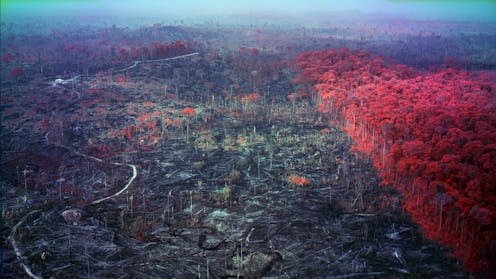
Review: Richard Mosse: Broken Spectre, NGV International.
The Amazon is reaching a tipping point. Once a proportion of the rainforest is lost, it will no longer be able to hold the necessary moisture to create the rainfall to sustain itself. Massive dieback will occur with a devastating release of carbon into the atmosphere with a major global impact on climate change.
How does one make an artwork about this? One that possesses a dazzling beauty and, at the same time, has the ability to stop you in your tracks and shock you into action?
This is the mission the Irish-born, New York-based photographer Richard Mosse set himself in Broken Spectre, an immersive, 74-minute-long moving image work having its world premiere at the NGV.
On a 20 metre wide screen, Broken Spectre breaks with many existing cinematographic conventions and has created new technology through which to document this existential threat to the human species.
Read more: Is the Amazon rainforest on the verge of collapse?
A storyteller
Mosse started work on this project in 2018. Over the next few years he visited the Amazon more than a dozen times, on occasion staying in very remote villages for a couple of months at a time. Subsequently, he invited the Australian-born composer Ben Frost and the American cinematographer Trevor Tweeten as his collaborators to work in the field with him in Brazil.
Mosse is primarily a storyteller; his first degree was in English at Kings College London. Here, the narrative commences with the arrival of the settlers establishing their subsistence farming with a few cattle.
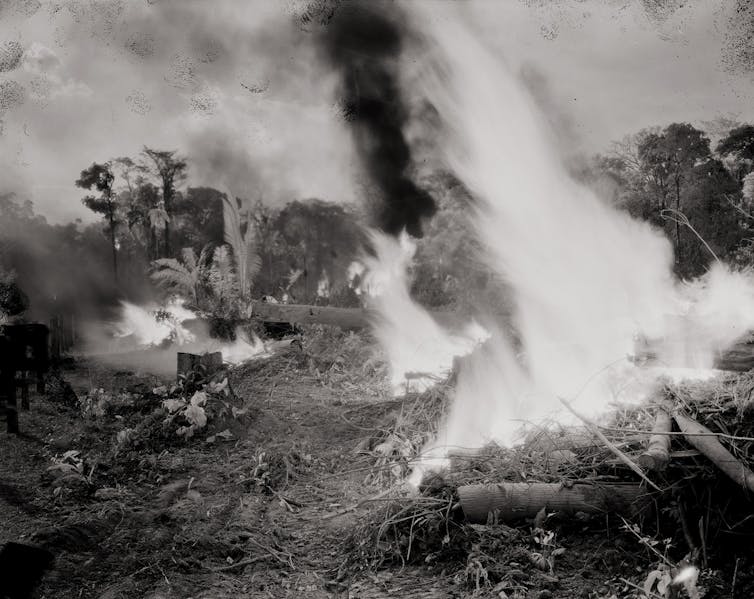
With time the settlers become environmental criminals, clearing more rainforest for cattle grazing and soybean. Then, destructive goldminers move in with their devastating hydraulic processes.
Great century-old trees are toppled, forests are burnt, waterways are polluted. The cattle industry adopts industrial proportions and the farmer settlers become mounted cowboys, loggers with huge chainsaws and miners.
There is a culmination in the story when a young Indigenous woman Adneia Yanomami speaks with passion to camera for seven minutes demanding help. She exclaims:
You white people, see our reality. Open your minds. Don’t let us talk so gallantly and do nothing. White people! Tell your fathers and mothers. Explain to them.
Later footage shows the demonstrations by Indigenous peoples in Brasilia and pockets of the Amazon that are still pristine and subject to ecological tourism.
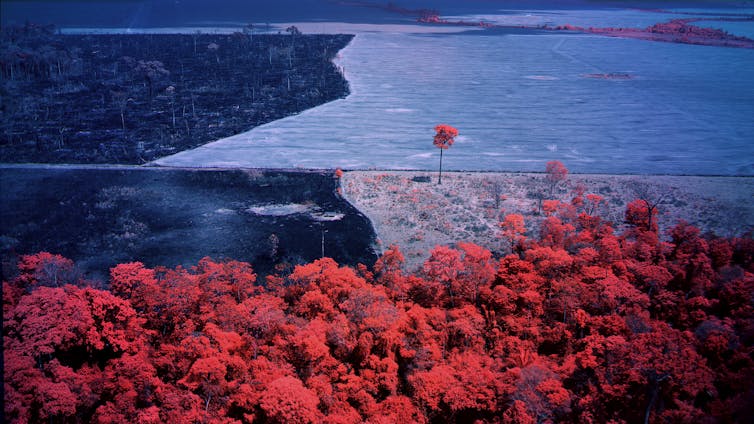
Read more: The great Amazon land grab – how Brazil's government is clearing the way for deforestation
Broken spectatorship
Mosse notes about his narrative:
My film examines an intergenerational destruction; a legacy passed on from grandparents to grandchildren. We have only one generation left to save the Amazon rainforest.
The strength of the storytelling in part lies in that it is not a linear narrative. It is presented in patches with seams or fault lines apparent between the sweeping aerial views of dying forests presented as a surreal experience, the mounted cowboys, proud Indigenous peoples, scenes of the majestic Amazon, cattle slaughter yards and family gatherings with a constant jump between micro and macro views.

Meaning resides not in any single narrative, but in the seams between discovered by individual viewers.
When I asked Mosse as to the meaning of the title, Broken Spectre, he said it was a reference to “broken spectatorship” – the failure of story telling when confronting a topic as vast as climate change. In his film, we experience something so vast, significant and urgent as to be almost incomprehensible, yet we see it in small mosaic pieces each viewer will individually assemble together.
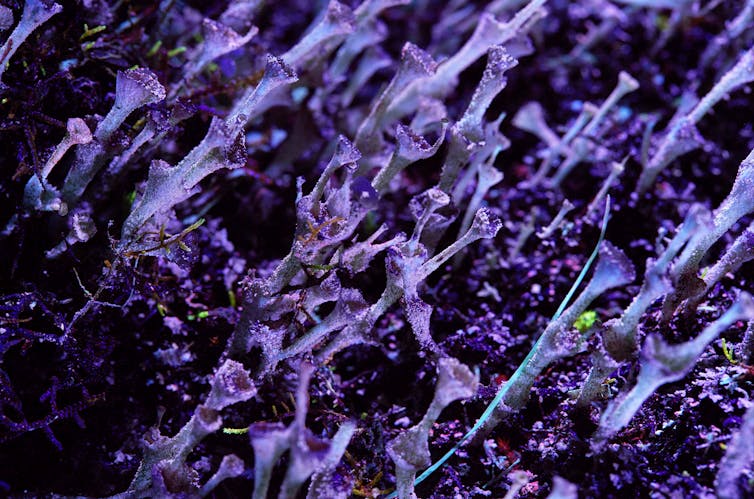
In terms of film history, Broken Spectre to some extent taps into the tradition of Sergio Leone’s spaghetti westerns as these modern-day cowboys settle in the Amazon.
In the old Soviet film I am Cuba (1964), the director, Mikhail Kalatozov, used infrared film (obtained from the Soviet military) to exaggerate the contrast between colonial oppression and the new Cuba. Mosse employs infrared imagery for many of the scenes of devastation. In the film, there may also be a nod to Werner Herzog’s Lessons of Darkness (1992) that documented a different ecological disaster.
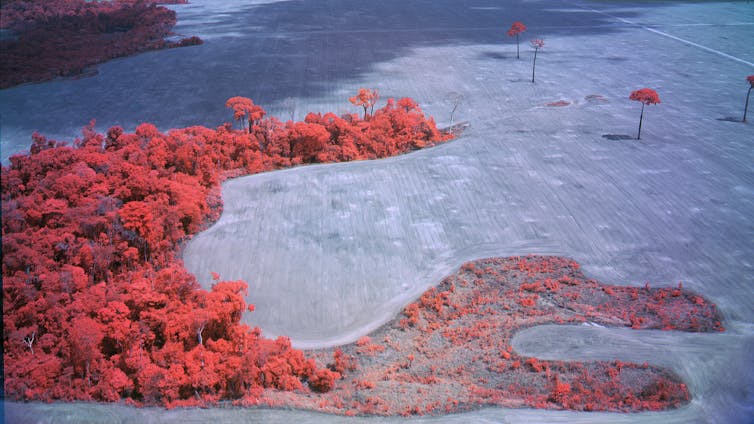
Beautiful and terrifying
In his technical strategies, Mosse designed and had built for him a special multispectral camera that, when suspended from a helicopter, enabled the sweeping panoramic views of devastation in the Amazon. The landscapes appear as eerie and surreal, simultaneously beautiful and terrifying.
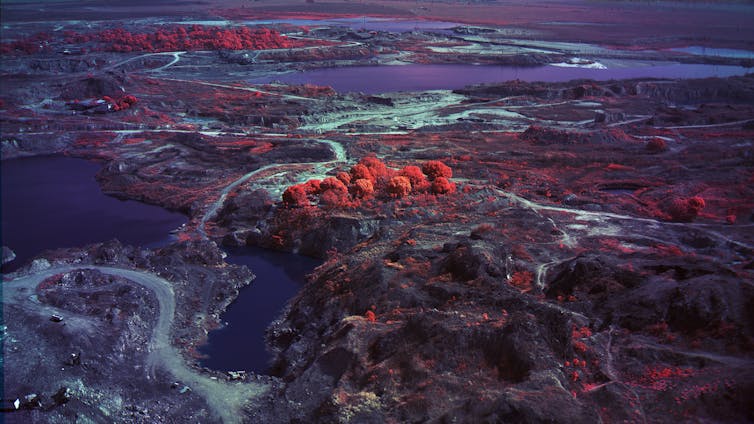
Satellite data has been a key to documenting the destruction of the Amazon. By combining geographic information system data with art photography, Mosse creates deeply disturbing realities.
The destruction is on many different fronts. The film presents indexical levels of information, sweeping vistas as well as highly emotionally charged scenes that can only be read on a human level.
Frost, Mosse’s long-term musical collaborator, has responded to the challenge of the visual with a soundtrack echoing westerns, the sounds of the rainforest and sounds of destruction and some recorded on an ultrasonic recorder. The sounds are haunting, emotional and profoundly disturbing. In one sequence, environmental criminals are felling some of the giants in the forest. After the piercing noise accompanying the death of an ecosystem there follows a deadly silence that fills the entire space.

Broken Spectre is a very beautiful but profoundly disturbing film: at times glorious and heroic but simultaneously tragic and horrifying. Despite Mosse’s high-tech equipment, there is a very artisan-like, handmade quality to the presentation – a humble human plea to save the Amazon and the human species.
Richard Mosse: Broken Spectre is at NGV International until April 23 2023.
Sasha Grishin does not work for, consult, own shares in or receive funding from any company or organisation that would benefit from this article, and has disclosed no relevant affiliations beyond their academic appointment.
This article was originally published on The Conversation. Read the original article.







